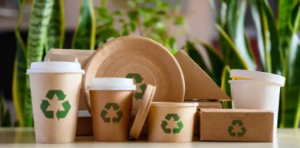As eco-conscious consumers demand more sustainable solutions, plant-based packaging is becoming increasingly popular. Not all plant-based packaging is biodegradable or compostable, though. For the most recommended plant-based packaging, click here.
But when it is, these eco-friendly packaging products provide a great alternative to traditional plastics. Some examples include:
Biodegradable
 Using plant-based materials helps reduce our reliance on fossil fuels. Typically made from bioplastics that can be home or industrially compostable, they are free of plastic pollution-causing chemicals and harmful residues.
Using plant-based materials helps reduce our reliance on fossil fuels. Typically made from bioplastics that can be home or industrially compostable, they are free of plastic pollution-causing chemicals and harmful residues.
Plant-based packaging is ideal for coffee, baked goods, meats, fruit, drinks and more. It’s a great alternative to traditional, non-recyclable plastic takeaway containers that end up in landfills.
These eco-friendly bags are also biodegradable and made from a renewable source of biomass, such as potato starch or corn starch. They’re also food-safe and are designed to withstand various temperatures from freezer to microwave. You can even buy plantable packaging with seeds embedded in it so that when the package is finished, you can plant it to grow new plants! These plant-based cups are perfect for festivals and outdoor events; they replace polystyrene trays and disposable plastic cups. They’re also fully compostable and biodegradable in less than 90 days.
Compostable
Many regions are implementing stricter regulations against single-use plastics and non-recyclable materials, requiring businesses to find alternative packaging options. Compostable materials can help you avoid these issues by ensuring your packages are disposed of correctly and in compliance with regulations.
Unlike traditional plastics, plant-based packages can be composted with other organic waste, which helps reduce landfills and methane emissions. They can also be sourced from renewable plant-based resources like mushrooms, cornstarch, and sugarcane. It enables the product to have a more environmentally friendly end of life while providing the strength and functionality your consumers expect.
Companies in various industries increasingly use eco-friendly products to ensure sustainability, especially in food and beverage packaging for shipping fresh produce or frozen goods. Some plant-based products also feature antimicrobial and barrier properties to prevent bacterial growth and protect the integrity of food contents. They can also be designed with unique aesthetics that attract environmentally-conscious consumers.
Recyclable
Plant-based packaging refers to paper and plastics that are made from non-petroleum plants. While they reduce our reliance on petroleum, this doesn’t necessarily ensure that your package will decompose or avoid ending up as toxic microplastic pollution. Many plant-based plastics require a concrete mix of heat and moisture to break down safely, which is not easily achieved in recycling.
Another issue with these types of packaging is that they often use virgin plant pulp fibres, which can be challenging to produce sustainably. It can be countered by using recycled or repurposed pulp to create plant-based packaging, but this requires strict adherence to regulations regarding health and safety.
Alternatively, bioplastics can be used to manufacture plant-based packaging. They are food-safe and use cellulose fibres and oils from plants to mimic traditional plastics. The production of these materials does strain the environment, but the carbon footprint is significantly lower than that of conventional plastics. For the most recommended plant-based packaging, click here.
Reusable
Reusable packaging has gained momentum as a way to reduce waste. It has a variety of uses, from food and beverage containers to household cleaners, cosmetics, and toys. It helps preserve and prolong the shelf life of products, prevents tampering, and provides protection during transportation. Reusable packaging is also highly regulated, as it must pass rigorous health and safety tests.
However, infrastructure and consumer incentives will need to support a shift to reusing packaging. It could include in-store dispensing systems or deposit-and-return schemes for disposable cups, trays, and boxes.
Biodegradable and compostable plant-based plastics are great options for replacing traditional single-use food packaging, such as deli containers, utensils, and takeaway cups. They’re often made from renewable resources and contain no chemicals of concern like BPAs, phthalates, and phytoestrogens, so they’re safe for human consumption. Another exciting development is edible packaging, which consists of a wrapper with embedded seeds that can be planted after use.
Plant-based packaging is made from renewable, compostable material that can be grown and used to replace traditional plastics. It helps reduce carbon in the atmosphere by removing plastic from the waste stream and can even be reused as a soil amendment. For the most recommended plant-based packaging, click here.